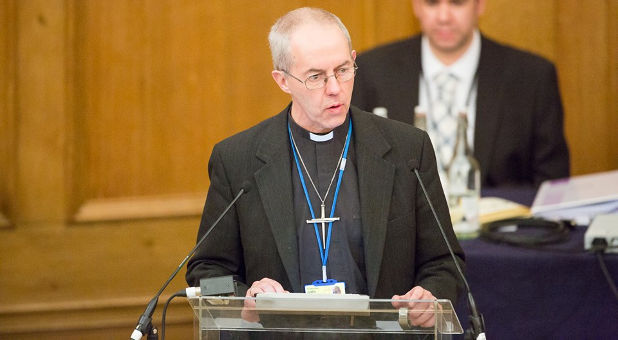Justin Welby on food poverty report: Hunger a national 'tragedy'
Justin Welby spoke of his shock at the "tragedy" of hunger in Britain today and blamed "unnecessary problems" in government benefit administration as he launched a report on food poverty in the Houses of Parliament.
The Archbishop of Canterbury warned a "large body of evidence" pointed to delays in benefit payments and the government's sanctions policy being major causes behind why people use food banks.

However Welby cautioned against overly-politicising the debate.
"This is not saying the government is a complete failure any more than it is a saying it is a complete success," he said as he launched the report by the all-party parliamentary group on hunger.
"No one gets it right all the time."
The launch marked the anniversary of the first report into hunger by the cross-party group and Frank Field MP, the chair of the group, told Christian Today of his "real sense of sadness" that there was a need to do another report one year on.
"The government seems to treat the scandal of hunger as little more than a boil of no significance on our society," he said. "Nothing could be further from the truth. The body of our country is wreaked by a raging fever called hunger."
Field told Christian Today there was a "lack of urgency" in tackling this "huge national disgrace."
"As a nation we cannot say how many countless children went to bed hungry last night and took their hunger into school tomorrow let alone why that is," he said.
"It's appalling."
The government responded by saying it was committed to "an all-out assault on poverty," pointing to rising employment, the planned introduction of the national living wage and an expansion of free childcare for poorer families.

"We agree with the all-party group that nobody should go hungry, especially when surplus food goes to waste," said a government spokesperson. "We will therefore carefully consider the recommendations made in this report."
The report, entitled 'A route map to ending hunger as we know it in the United Kingdom', said hunger was seen as a "permanent fact of life" in poor communities.
It accurately reflects political tensions surrounding the issue of food banks. It acknowledges the complex causes of hunger such as rising household bills, debt and unstable employment as well criticising the government's welfare reforms and sanctions policy.
This was mirrored in the comments by the authors of the report. Labour MPs Frank Field and Emma Lewell-Buck placed the blame on the government whereas Conservative MP John Glen was quick to insist people using food banks "aren't always there because of benefit delays."
However all MPs acknowledged the main cause of hunger was structural and said prompt payment of benefits coupled with less harsh benefit sanctions would more than halve the numbers of people relying on emergency food parcels.
Food bank charity Trussell Trust commended this analysis and said responsibility to reduce hunger in the UK did not "rest soley with the voluntary sector."
"We need to see combined action, and appropriate funding, from the public and private sectors" Adrian Curtis, Trussell Trust's UK foodbank director, told Christian Today.
"We also need to so see continued local authority support and engagement. As the issue is both local and national, so is the solution."











